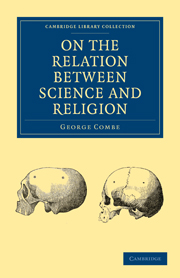Book contents
- Frontmatter
- Contents
- ADVERTISEMENT
- INTRODUCTION
- CHAP. I On the present state of the relation between Science and Religion
- CHAP. II Definition of the words Science and Religion, and Elucidation of the complex character of Religion
- CHAP. III Of Man
- CHAP. IV Of the extent to which Man is able to discover the Ultimate Elements or Essence of the External World
- CHAP. V Of God
- CHAP. VI Can we trace Divine Government in the Phenomena of the Physical and Moral Worlds? And if so, by what means is it maintained and rendered efficient?
- CHAP. VII Historical Evidence that the Divine Government of Nations is Moral
- CHAP. VIII Is this World, such as it now exists, an Institution?—Or is it the Wreck of a better System?
- CHAP. IX Practical Considerations
- CHAP. X Conclusion
- APPENDIX
- Frontmatter
- Contents
- ADVERTISEMENT
- INTRODUCTION
- CHAP. I On the present state of the relation between Science and Religion
- CHAP. II Definition of the words Science and Religion, and Elucidation of the complex character of Religion
- CHAP. III Of Man
- CHAP. IV Of the extent to which Man is able to discover the Ultimate Elements or Essence of the External World
- CHAP. V Of God
- CHAP. VI Can we trace Divine Government in the Phenomena of the Physical and Moral Worlds? And if so, by what means is it maintained and rendered efficient?
- CHAP. VII Historical Evidence that the Divine Government of Nations is Moral
- CHAP. VIII Is this World, such as it now exists, an Institution?—Or is it the Wreck of a better System?
- CHAP. IX Practical Considerations
- CHAP. X Conclusion
- APPENDIX
Summary
The highest object to which the religious emotions of any people are directed, constitutes their God. When their notions concerning that object are combined with the religious emotions, the object becomes sacred, is hallowed and adored; and these opinions become the grand foundation of the rest of their faith. The natural mental process by which ideas of God have been formed appears to be the following. The faculties of Wonder and Veneration give us a tendency intuitively to believe in a supernatural cause of the remarkable phenomena of nature which we see and feel, but cannot comprehend. The faculties of Individuality and Imitation prompt us intuitively to personify abstract ideas and active powers. The Greeks and Romans, unable to account scientifically for the cause of the winds, ascribed it to a supernatural power, personified it, and called it Æolus, or the God of the Winds. Roused to admiration by the teeming fertility of the soil, and unable to comprehend its cause, they attributed it also to a supernatural power, and personified it; and as, in the animal economy, the producer is feminine, they were led by analogy to invest it with this sex; hence arose the Goddess Ceres. These nations multiplied deities to represent the causes of all the interesting and impressive phenomena of nature of which they could give no other account, including human passions, emotions, and intellectual powers.
- Type
- Chapter
- Information
- On the Relation Between Science and Religion , pp. 66 - 81Publisher: Cambridge University PressPrint publication year: 2009First published in: 1857

